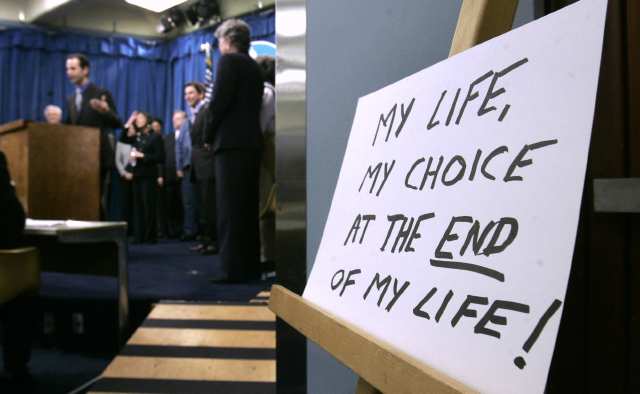 OTTAWA- The federal government is appealing a B.C. court ruling that struck down a ban on assisted suicide, saying the law is needed to protect Canada’s “most vulnerable” citizens.
OTTAWA- The federal government is appealing a B.C. court ruling that struck down a ban on assisted suicide, saying the law is needed to protect Canada’s “most vulnerable” citizens.
Justice Minister Rob Nicholson announced Friday that Ottawa will appeal the decision to the British Columbia Court of Appeal and will seek a stay on the lower court judgment.
This article was published by The Toronto Star on July 13th 2012. To see this article and other related articles on The Toronto Star website, please click here
He said Criminal Code provisions that prohibit medical professionals and others from assisting suicides are “constitutionally valid.”
“The laws surrounding euthanasia and assisted suicide exist to protect all Canadians, including those who are most vulnerable, such as people who are sick or elderly or people with disabilities,” Nicholson said in a statement.
The widely anticipated appeal means that the emotional debate over the controversial topic will almost certainly end up at the Supreme Court of Canada and perhaps even Parliament.
The latest challenge to Canada’s assisted suicide law centres on the case of Gloria Taylor, who has late-stage ALS, or Lou Gehrig’s disease.
In June, Justice Lynn Smith, of the B.C. Supreme Court, ruled that current right-to-die laws are discriminatory and unconstitutional. She said the law’s provisions “unjustifiably infringe on the equality rights of Gloria Taylor and the rights of life, liberty and security of the person.”
In her 395-page ruling, Smith granted Taylor, 64, a constitutional exemption to proceed with physician-assisted suicide. However, no one else can avail of the exemption. She placed a 12-month suspension on her ruling to give Parliament time to write new legislation, or for the anticipated appeals.
At the time, Taylor praised the ruling, saying Canada had “emerged from the dark ages.”
“We no longer have to die a horrible and tormented death,” she said in June.
But Nicholson is seeking to put Taylor’s exemption on hold as well, saying the government “objects to the lower court’s decision to grant a ‘constitutional exemption’ resembling a regulatory framework for assisted suicide.”
Ottawa’s appeal decision was praised by groups who oppose any changes to assisted suicide laws, fearing it would be a “slippery slope.”
Jack Fonseca, of Campaign Life Coalition, said Smith’s decision would have meant “wide open euthanasia and assisted suicide.”
“We’re ecstatic that the government has taken a sane response of pushing back against this judicial activist decision, this lethal decision that will unleash a culture of death on Canada under the pretense that there are any kind of safeguards,” Fonseca said in an interview.
However, Udo Schuklenk, a medical ethics expert at Queen’s University, believes that change is coming to Canada’s assisted suicide laws due to the experience in other jurisdictions, like Oregon.
“We have so much evidence with regard to what the effects are in civilized societies that have decriminalized it,” he said.
“We know that all the concerns about abuse taking place, slippery slope and large numbers of people getting killed . . . all of that is nonsense,” Schuklenk, a philosophy professor, said in an interview.
“This why I think the game has changed and why I personally think it’s inevitable, just a matter of time.”
Schuklenk headed a Royal Society of Canada study that examined end-of-life issues. It recommended last November that Canada should have a “permissive yet carefully regulated and monitored system with respect to assisted death.”
